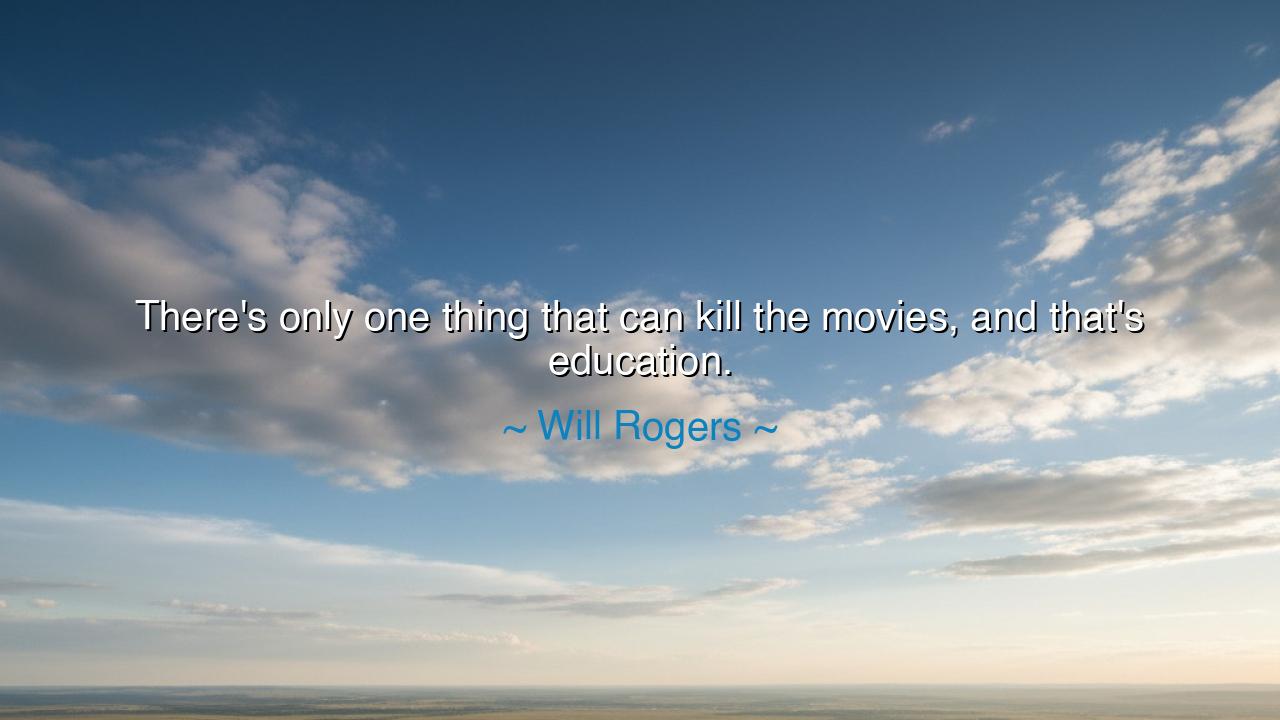
There's only one thing that can kill the movies, and that's






"There's only one thing that can kill the movies, and that's education." These words from Will Rogers carry with them a deeply evocative meaning, one that touches on the soul of art itself. Movies, as we know them, are a form of escape, a place where the imagination can roam free, where reality is not confined by the chains of logic or rigid instruction. They are meant to capture the heart and stir the soul, evoking emotion and thought without the heavy hand of education to weigh them down. Rogers suggests that once the mind is burdened by the constraints of knowledge, the beauty of cinema can lose its magic, its raw power to evoke wonder and awe.
In the ancient world, it was understood that creativity and knowledge often walk different paths. The philosophers and artists of old knew that to engage with the human spirit, one must allow the freedom of expression, unfettered by the weight of too much learning. Plato himself, though a philosopher of the highest order, once cautioned that the arts should not be overrun by reason, for in doing so, they lose their power to speak to the soul. Just as rivers must flow freely to nourish the land, so too must art, like the movies, flow freely to nourish the imagination. When bound by the chains of rigid education, it becomes something else—something more akin to a lecture than a living, breathing experience.
Consider the great epics of ancient Greece, such as Homer's Iliad and Odyssey, or the plays of Sophocles. These were not works of dry intellectualism. They were stories that reached the heart of humanity, exploring the passions, struggles, and triumphs of the human spirit. If these works had been reduced to mere academic texts, stripped of their emotion, their humanity, and their raw expression, they would have lost their power. What made them timeless was not their intellectual weight, but their ability to speak to the heart in a language that transcends reason. Similarly, the movies that endure in our hearts are those that reach us deeply in ways beyond mere analysis.
One might look at the rise of silent films, such as those crafted by Charlie Chaplin or Buster Keaton, whose works flourished without the need for sophisticated dialogue or explanations. Their genius lay in their unspoken communication, their ability to tell stories that moved the heart with nothing more than the language of gesture, expression, and emotion. Education, in its modern sense, could have easily stripped away this purity, replacing it with the constraints of knowledge and form. The magic of cinema was found in its ability to transcend the spoken word, relying instead on the raw power of human experience.
History is replete with examples of art and expression that thrive in the absence of over-education. Vincent van Gogh, the brilliant painter, created works that were driven not by the academic principles of his time, but by his intense passion and vision. His Starry Night, with its swirling, expressive forms, speaks not of intellectualism but of a deeper, almost mystical engagement with the world around him. Had he been more bound by the expectations of academic rigor, his masterpieces might have never come to life. Similarly, cinema, in its purest form, is not a product of scholarly endeavor but of imagination, where emotion and feeling take precedence over the weight of intellectual analysis.
The lesson that Will Rogers offers is clear: creativity thrives when freed from the constraints of excessive education, and it is in the emotional, visceral response to art that we find its true power. While knowledge is a treasure, it should not overshadow the beauty of raw expression. Art, in all its forms, is meant to stir something within us that cannot be explained by logic or taught in a classroom. Movies, as a medium, invite us to step away from the rigid structures of intellectualism and into the boundless world of imagination.
Thus, we should not allow ourselves to become prisoners of analysis, but rather, we must learn to embrace the unfettered joy of creative expression. When we engage with art—whether it be cinema, painting, or music—we must not seek to dissect it with the coldness of intellect. We must let it speak to us in its raw, unpolished form, for it is in that immediacy that we find its truest power. As Will Rogers so wisely teaches, there is a danger in over-education. The true magic of the movies lies not in what we know, but in the feelings they awaken within us.






AAdministratorAdministrator
Welcome, honored guests. Please leave a comment, we will respond soon